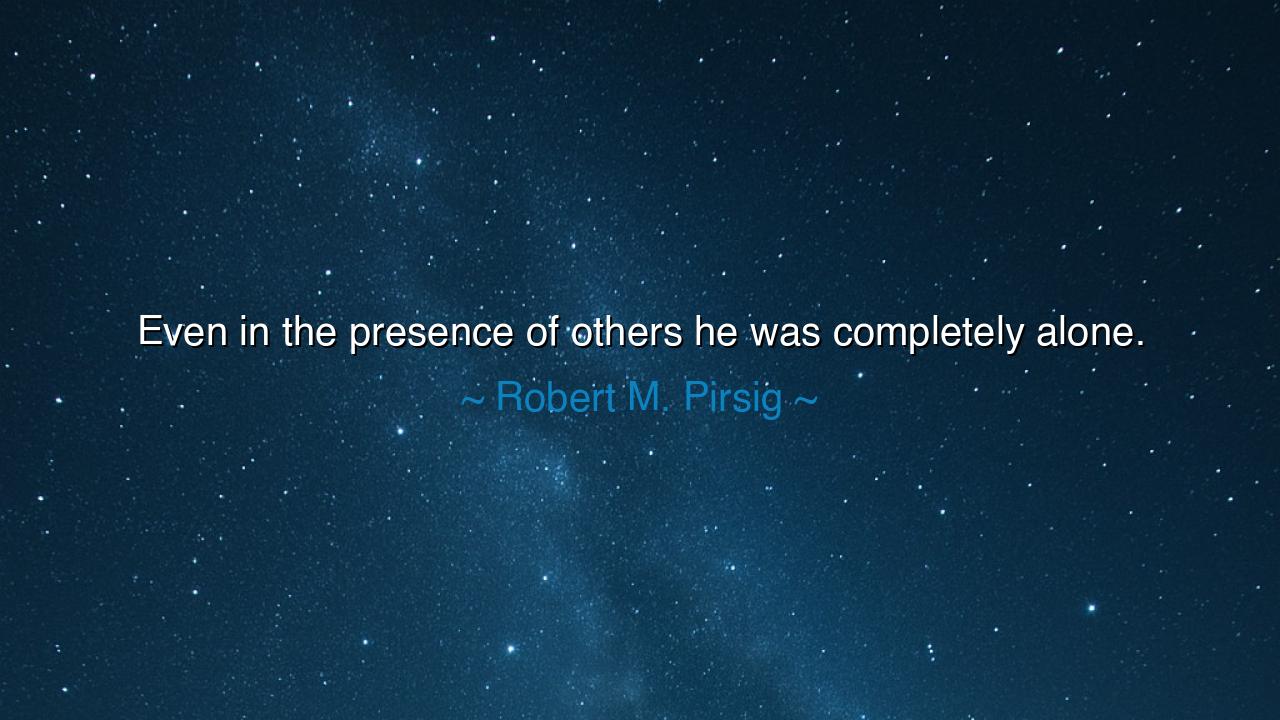
Even in the presence of others he was completely alone.






Robert M. Pirsig offers a haunting observation in his words: "Even in the presence of others he was completely alone." These words capture the deep solitude that can exist within even the busiest of crowds. One can be surrounded by people, can be part of the world, and yet feel the sting of isolation deep within their soul. This form of loneliness is not born of external circumstances but is a condition of the heart, a disconnection from others that persists even in the presence of company. Pirsig’s insight speaks to the universal truth that true connection is something far deeper than mere proximity or physical presence; it is a bond of understanding, empathy, and shared experience.
From the ancient days of philosophy, the question of solitude and connection has been a subject of contemplation. The great Stoics such as Seneca and Epictetus warned of the perils of emotional dependence on others for one’s sense of worth or happiness. Seneca wrote, "A friend is a second self," but he also cautioned against seeking validation from others, for the ultimate measure of one's character lies within. One can be surrounded by companions and still remain disconnected if their soul is not aligned with the virtue and purpose of life. To be truly connected with others, one must first be at peace within themselves, for only then can they truly share their thoughts, experiences, and life with others without feeling alone.
Consider the life of Diogenes, the philosopher who lived in a barrel on the streets of Athens. Though he often interacted with those around him, he was famously indifferent to society’s norms and judgments. Diogenes chose solitude in the sense that his existence was outside the typical bounds of social expectation. Yet, even in his isolation, he was deeply connected to the nature of human existence, seeing more clearly than those around him the falsehoods and distractions that kept people from truly engaging with life. In this sense, Diogenes was never alone, for his connection to truth was profound and unshakable, whereas many of his contemporaries, though surrounded by people, lived lives full of superficial disconnection and self-deception.
The great tragic figure of Hercules, though a demigod, provides another poignant example. Despite his immense strength and the fame he garnered through his labors, Hercules was often a man of great loneliness. He fought battles not only against monsters but against his own inner turmoil. His journey, marked by both great feats and intense suffering, illustrated that even a hero surrounded by the adoration of others can feel isolated within. His pain, which led to his eventual self-destructive end, was not because of his lack of external connections, but because of his inability to find peace with his own inner battles. In this, we see that external approval and physical presence of others cannot shield us from the despair that often arises from within.
Even in modern times, the misunderstood artist, the writer, the philosopher, or the visionary often experiences the same isolation. Vincent van Gogh, the troubled painter, was surrounded by those who cared for him—family, friends, patrons—but still lived a life of intense solitude. His genius was often misunderstood, and his inner world of vibrant color and emotion was out of sync with the society in which he lived. Though people saw him, they could not see the depths of his mind or understand his turmoil. In this way, van Gogh was never truly connected to the world around him, and the tragedy of his life was not the physical distance from others, but the emotional distance that kept him apart.
The lesson here, dear reader, is that true connection with others cannot be found in mere presence. Solitude, whether self-imposed or accidental, is not solely about being physically alone but about the disconnection that exists when we are unable to relate to others on a deeper, more authentic level. To be in the company of others is to share not only space but thoughts, feelings, and experiences. To feel alone in the presence of others is to be disconnected from that deeper essence of humanity that binds us together.
Therefore, I urge you to reflect on your own life. Are there moments when you find yourself alone even when surrounded by friends or family? Are you truly connecting with those around you, or are you merely sharing the same physical space while remaining emotionally distant? Strive, then, to create genuine connections, to reach out beyond the surface of conversation, and to seek understanding. Be vulnerable, share your thoughts, and listen deeply to the souls of others. In this way, you will bridge the gap between mere presence and true connection, and you will find that you are never truly alone. Let this be your path—to not merely exist in the world, but to deeply engage with it and the people around you. Only then will you realize that even in moments of solitude, you are never truly alone.






AAdministratorAdministrator
Welcome, honored guests. Please leave a comment, we will respond soon